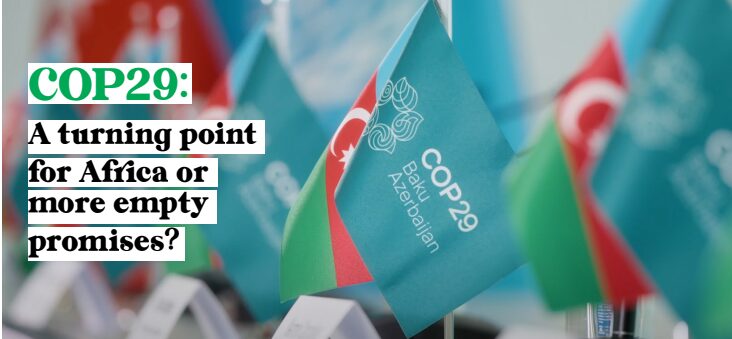Vellum Green COP29: A turning point for Africa or more empty promises?

As the global community focuses on COP29, the 2024 UN Climate Change Conference in Baku, Azerbaijan, many are left wondering if this year’s summit will bring about genuine progress or if it will simply repeat past unfulfilled promises. For Africa, COP29 is a pivotal moment in the quest for climate justice. The continent, which contributes minimally to global emissions, is bearing the brunt of climate change—experiencing more severe droughts, floods, and food insecurity.
With high hopes following the groundwork laid at COP28 in Dubai, COP29 is expected to address pressing issues. One significant outcome of COP28 was the creation of the Loss and Damage Fund, designed to provide financial support to countries affected by climate-related disasters. However, the lack of clarity on the fund’s operation—such as its funding sources, governance, and distribution methods—poses a significant challenge. For African nations, the need for transparency and accountability in finalising these details at COP29 cannot be overstated. Without these, the fund risks becoming just another unfulfilled promise.
A persistent challenge from previous COPs has been inadequate climate finance for adaptation. While much attention has been given to mitigation efforts like transitioning to renewable energy, adaptation initiatives, which are crucial for countries in Africa, have faced significant underfunding. The agricultural sector, a cornerstone of Africa’s economy, is increasingly at risk from climate impacts. Securing funding for climate-resilient agricultural practices and protecting livelihoods is a top priority for African leaders at COP29.
Another important issue will be implementing National Adaptation Plans (NAPs), which are essential for ensuring that vulnerable countries have organised strategies to tackle the effects of climate change.
African nations have presented ambitious Nationally Determined Contributions (NDCs), but the realisation of these plans hinges on substantial financial and technical assistance. What makes COP29 unique? The potential of Azerbaijan’s initiative to shift its energy production towards renewable sources offers a beacon of hope. With over 90% of its exports derived from oil, Azerbaijan is making significant strides in transitioning to green energy, providing a model that many African countries could follow with the right support.
The pressing question, however, is whether wealthier nations will fulfil their financial pledges to assist African countries in seizing similar opportunities.
Kenya is poised to be a prominent voice at COP29. Renowned for its leadership in renewable energy, with over 75% of its electricity sourced from renewables, Kenya is in a strong position to advocate for increased international backing for Africa’s green transition. Moreover, Kenya’s dedication to nature-based solutions—like reforestation and ecosystem restoration—serves as an exemplary model for the continent.
At COP29, Kenya is expected to advocate for enhanced financial and technical support for these initiatives, which offer long-term environmental and economic advantages.
In summary, COP29 has the potential to be a pivotal moment for Africa. The conversations surrounding the Loss and Damage Fund, adaptation financing, and green energy transitions are vital for the continent’s future. However, much hinges on whether developed nations will finally rise to the occasion and meet their climate finance commitments. Will this year’s summit break the cycle of unfulfilled promises, or will Africa continue to bear the brunt of climate change with minimal support? The world will be watching closely.

